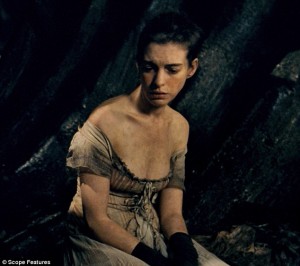Les Miserables: a Life Worth Living
In our first review of Les Miserables, we focused on the clash between Javert and Valjean, between law and grace. We didn’t touch on Fantine’s part in the tale, and now that Anne Hatheway took home a Best Supporting Oscar (and we all can take home the film on Blu-ray and DVD) it’s time we addressed the passionate song that has moved people for years and the tear-inducing performance in this latest adaptation of Victor Hugo’s story. We’re also giving away some copies of the film! See below.

“I had a dream my life would be so different from this hell I’m living…” – Fantine, Les Miserables
Fantine’s love, devotion and sacrifice for her daughter Cosette has been discussed for more than a century… as a “saintly prostitute” figure, a motherly martyr, an example of the brutal life many women faced in nineteenth century France, and more. A few have been less kind, seeing less victimhood and attaching all of her suffering as a Catholic culture’s commentary her initial sexual transgression. Regardless, her brokenness and kindness present her character holy, set apart, and one of the pivotal moments in life that leads to the profound change in Valjean: Fantine is the punctuation on a sentence of redemption started by the bishop, the spark and fire for the changed man central to Hugo’s story. Fantine’s brief moments onscreen in the musical are so powerful, her story in many eyes dwarfs the rest of the arcing tale of love and sacrifice.

“Now life has killed the dream I dreamed.”
Oddly enough, I’m reminded of the movie “UP”, wherein the first eight minutes are a powerful story in their own right, in my mind outshining the rest of the film entire. While I don’t think Fantine’s powerful song, character, and performance in Les Miserables undermines the rest of the lengthy film, it certainly gives the story the same level of potency and makes if difficult for anyone to hold or hide their tears. This movie may not be what you throw in when you’re looking for a light diversion, but when you’re in the mood for a musical that evokes deep emotion it’s hard to think of one that will rival its impact.
“Greater love has no one than this, that someone lay down his life for his friends.” – John 15:13
 Whether or not we want to quibble over Fantine’s level saintliness, I’m not sure anyone imagines her as perfect. Her victimization, however, is undeniable, and in a culture presently focused on the abuse of women, horrors of sex trafficking, and the lack of love or understanding for many people trapped in these downward spirals, the flowing descent set to song is a testimony to how easy it is to fall victim, uncertain of any other option and feeling that increasing sense of hopelessness. Most of us can’t say we’ve fallen that far, or into a societal crevasse that deep or painful, but something about Fantine’s song resonates with everyone. It often seems that life itself – the systems, the structures, the seemingly random circumstances – all keep chipping away at our hopes and dreams. Fantine’s song becomes the outcry we all feel at some degree – physically, emotionally, spiritually – as our childhood dreams seem dashed, one by one, against the rocks of reality. Fantine’s persistence to love, to give herself up, until her tragic end becomes a testimony to her faith in the face of suffering. Her hair, her health, her teeth… her body is sacrificed piece by piece, until there is virtually nothing left.
Whether or not we want to quibble over Fantine’s level saintliness, I’m not sure anyone imagines her as perfect. Her victimization, however, is undeniable, and in a culture presently focused on the abuse of women, horrors of sex trafficking, and the lack of love or understanding for many people trapped in these downward spirals, the flowing descent set to song is a testimony to how easy it is to fall victim, uncertain of any other option and feeling that increasing sense of hopelessness. Most of us can’t say we’ve fallen that far, or into a societal crevasse that deep or painful, but something about Fantine’s song resonates with everyone. It often seems that life itself – the systems, the structures, the seemingly random circumstances – all keep chipping away at our hopes and dreams. Fantine’s song becomes the outcry we all feel at some degree – physically, emotionally, spiritually – as our childhood dreams seem dashed, one by one, against the rocks of reality. Fantine’s persistence to love, to give herself up, until her tragic end becomes a testimony to her faith in the face of suffering. Her hair, her health, her teeth… her body is sacrificed piece by piece, until there is virtually nothing left.

What gives any of us that kind of fortitude? If our own dreams are being put to death as we face the trials and tribulations of this world, what gives us the hope to carry on amidst pain and tears? The song of Fantine gives us some great opportunities for conversation about our hopes, our dreams, and the way we face the rigors of the world that change or destroy them. Why is it that our world seems broken – that WE seem so broken – and so much of the world hostile?
“There was a time when men were kind… and the world was a song, and the song was exciting. There was a time then it all went wrong…”

While this may be Fantine’s commentary on her own perception of the world, it also serves as commentary on the way we feel things should be in the face of the fractured way they currently are. The lack of harmony, the lack of joy, the lack of melody in the world replaced by discordant noise… why is it we sense a way we ought to be and yet cannot achieve it, individually or corporately? The film goes on to contrast law and grace (or perhaps more aptly put, the world’s wisdom versus that of the gospel) through the actions of the bishop and then a transformed Valjean. The musical presents no solution (in its fullness) presented in this life, but instead demonstrates that our ultimate hope lies in the reconciliation and restoration in the life to come.
It’s tragic to consider that some see this only as a dream, a wish, a fleeting human notion killed by the hellish reality that this dream-eroding life is all that we have. Persisting, sacrificing, and losing yourself for others becomes unbearable, even absurd, if this is true. While the musical may not precisely spell out all the nuance of how restoration, reconciliation, and the heavenly vision is achieved, a big budget and Academy Award winning movie championing such a reality seems like a rare treat, and one worth talking about. According to the message of Jesus Christ, the vision of Fantine and Valjean is not a dream we dreamed, but the reason life is worth living.
“…present yourselves to God as those who have been brought from death to life, and your members to God as instruments for righteousness. For sin will have no dominion over you, since you are not under law but under grace.” – Romans 6
Questions for discussion:
- What dreams of yours have been crushed beneath culture, circumstance, or persons in your life?
- What is your vision of how the world should be, and why do you think it doesn’t measure up?
- Do you believe it ever had a true and proper shape, or has it always been broken this way?
- With so little to hold on to, why would – or do – you pour yourself out for others?
- Is there truly hope for the heavenly vision we see at this musical’s end? How or why?
We’ve covered Valjean, Javert, and Fantine amidst the many characters in Les Miserables. Which of ALL the characters do you resonate with most, and why? We’re giving away 2 copies of Les Misérables (Two-Disc Combo Pack: Blu-ray + DVD + Digital Copy + UltraViolet) for our favorite answers. Let the comments commence!




Javert.
The struggle with Justice and what that looks like and then when he is confronted with Grace and forgiveness blows his mind. ……love to expand at some point 🙂